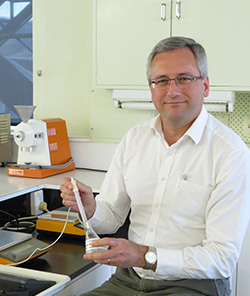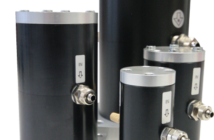Recently elected president of the New Zealand Institute of Food Science and Technology NZIFST, Dr David Everett has his eyes firmly set on ascertaining the knowledge base of the Institute’s 1200 members and increasing the value of that expertise to relevant government departments and agencies.
Dr Everett is a well respected and widely published academic who teaches in the food science department at the University of Otago and who lends his extensive knowledge to such organisations as the Riddet Institute, the American Dairy Science Association, the Institute of Food Technologists and the Sigma Xi Scientific Research Society. His academic research interests include – colloid and surface chemistry of dairy products, physical chemistry of emulsions, cheese physics and chemistry, protein-polysaccharide interactions, and rheology and food structure.
Recently elected to the position of NZIFST president, Dr Everett says his primary focus in the short term is carrying on the work of furthering the interests of the Institute’s members.
“We are a society of members,” Dr Everett says. “And the focus is on creating value for our members. We will look at what is going on with our members. My focus at the moment is looking at the Institute as a whole with a fresh new team.
“In the past we have looked at crash courses providing up-to-date knowledge on current hot topics. Our members are first and if we can help them be more knowledgeable in employment, then we will do that,” Dr Everett says.
The NZIFST was formed in 1965 and was initially linked to the emerging discipline of food technology at Massey University. Today the Institute is much more broadly based and national. The Institute’s membership comprises food technologists and scientists from many disciplines, including consumer and applied science, food science and food engineering, as well as food technology.
Generally speaking the NZIFST ensures members are connected and informed by holding regular branch meetings, workshops and seminars and through publishing a fortnightly newsletter. Each year the Institute holds a comprehensive annual conference that brings together an extremely wide range of experts from across the world in all aspects of food science and technology. This year’s conference was held in Hastings and attracted a number of world class speakers, as well as exhibitors and visitors.
In terms of size, the Institute represents a significant number of extremely knowledgeable people who are at the forefront of their particular fields and Dr Everett is keen to ensure that not only is that knowledge shared by members but that it is put to good use to further the interests of the New Zealand food industry.
“I’d like to see more engagement with government – putting ourselves up as an institute with a lot of knowledge. I’d like to come up with a database of that knowledge and to connect government agencies with the right people,” he says.
And in an industry that is sometimes divided over particular issues, Dr Everett is keen to stress that the NZIFST does not proffer opinions itself.
“The Institute has no position on food science and technology, our members do. We encourage members to speak out on matters they are knowledgeable about. Even with controversial issues there are always two sides of the coin. However, we are keen to see an appropriate food bill before parliament. It does need to be updated as it’s now 30 years old,” he says.
Dr Everett speaks very highly of the research in the food industry, particularly in the dairy sector, while pointing out that we could still do more.
“Our dairy industry is huge – over a quarter of our economy and we are a world stage player. Fonterra undertakes fantastic research and so does the public funded sector – especially the Riddet Institute, which does a lot of cutting edge research. We do well in food research but we don’t do enough. One of the problems is that because we are so lean there is no spare cash to put into R&D, so we have to get the most out of the investment.”
“We produce over 19 billion litres of milk a year – we drink three percent and export 97 percent. We hold two percent of the world milk supply but 40 percent of the export market and that’s without subsidies, unlike other countries. We are a large scale, mean machine. We have to be clever about what we produce and sell and that needs top notch dairy science and technology,” he says.
Collating the knowledge base of the NZIFST will be quite a feat but the value to the New Zealand knowledge economy is substantial and vital. Nearly five decades on from its creation, the Institute carries on its mission statement “to be the New Zealand society for food industry professionals, benefiting members and humanity through the development and promotion of technical proficiency, ethical practices and communication”.





























































































